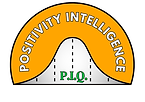Evolution to Positivity Intelligence
The Evolutionary Path to Positivity Intelligence
I connected the dots to identify the PIQ.
Perhaps the most popular characteristic of success or achievement is how "smart" that person or organization has been. And "smart" has usually been associated with the familiar IQ.
But for positive thinking, there is no formal definition or measurement, and that led to developing the Positivity IQ concept.
-
Are some people naturally smarter about how to be more positive and know how to use positive thinking to achieve their goals?
-
Is it possible to learn to be a more intelligent manager of positive thinking?
There are thousands of years of philosophy and books about the power of positive thinking and advice for being more positive. But they all stopped short of defining the threshold for effective Positivity.
I built on the known characteristics of general intelligence (IQ) to make the leap to what turned out to be pretty much commonsense observation.
Our human ability to think, and to think about what we think, has been the most persistent of human interests. And the quality and expression of a person's thinking has been connected to their perceived intelligence and abilities.
A short history of the evolution of intelligence measurement and the PIQ.
Intelligence 1.0
"Smart' : Year= 1898
The current concept of general intelligence was formalized in 1883 by English statistician Francis Galton. The standard I.Q. has been in use, with modifications, as a benchmark for how people score on standard tests attributed to intelligence.
The "normal" I.Q. is the score of 100, the absolute average of all scores, and most people are in the middle range, representing 68% of all scores. You've seen this bell-curve in other contexts, e.g.economic data, polls, weather patterns and almost anything that is measured.
The key concept to remember: "most" people are in the middle range, which is 68% of all measurable scores.


Intelligence 2.0
Multiple Intelligences Year = 1983
Many successful people don't seem to have the Einstein-type IQ we associate with being super smart. So, is there something else that contributes to success?
In 1983 Harvard psychologist Howard Gardner published Frames of Mind: The Theory of Multiple Intelligences… people may have several kinds of "intelligence," … people can succeed in many aspects of life with different types of natural capabilities or intelligence.
This is the basic list of 9 types. Source: Wikipedia
-
Bodily-Kinesthetic intelligence
-
Existential Intelligence
-
Interpersonal Intelligence
-
Intrapersonal Intelligence
-
Linguistic Intelligence
-
Logical-Mathematical Intelligence
-
Musical Intelligence
-
Naturalist Intelligence
-
Visual-Spatial Intelligence
Source: Wikipedia

Intelligence 3.0
Emotional Intelligence 1964, 1995
When it comes to happiness and success in life, EQ matters just as much as IQ. (Improving Emotional Intelligence (EQ) Helpguide.org
Although the term first appeared in 1964, it gained popularity in the 1995 … book Emotional Intelligence by … Daniel Goleman. …Some researchers suggest that emotional intelligence can be learned and strengthened, while others claim it is an inborn characteristic. Wikipedia
Emotional Intelligence was quickly recognized and accepted.
Intelligence 4.0
Positive Psychology Year = 1998
n 1998 Martin Seligman at the University of Pennsylvania introduced the concepts of positive psychology.
Positive psychology is the scientific study of what makes life most worth living, focusing on both individual and societal well-being. It studies "positive subjective experience, positive individual traits, and positive institutions...it aims to improve quality of life. It is a field of study that has been growing steadily throughout the years as individuals and researchers look for common ground on better well-being. Wikipedia
The professional acceptance of positive psychology is a great leap forward in recognizing that humans have natural characteristics of positive thinking, emotions and behavior. However, it's still in its infancy compared with the history of research on the negative aspects of human psychological behavior.
Intelligence 5.0
Year 2021 Positivity IQ.
I've read the literature, talked to the experts, and had therapy myself.
But I still found no practical way to truly understand what it means to be "more positive" nor how to measure it and manage it to serve my goals.
So I did the research connected the dots of historic and contemporary ideas to form a new theory of Positivity Intelligence.
-
What are common denominators for achieving the potential of each intelligence?
-
Intelligence represents potential capabilities, not guaranteed accomplishments. And for every potential trait, we still need to learn to develop and use that skill effectively.
-
To transform aspirational goals into successful outcomes, we must have belief and confidence, motivation and discipline, deal with discouragement, find ways around obstacles and persevere to reach a satisfactory level of success.
-
Positivity can be the driving force for a person to increase their probability of fulfilling their natural and learned capabilities.
-
Whatever the goal, you have to believe you can do it.
But how will you know if your beliefs, confidence, and the other elements of Positivity are strong enough to keep you motivated, disciplined, and resilient to persevere to reach your goal?
You need to know and increase your Positivity IQ.
%20(1).png)
